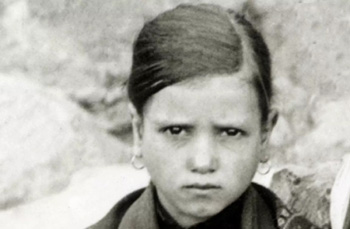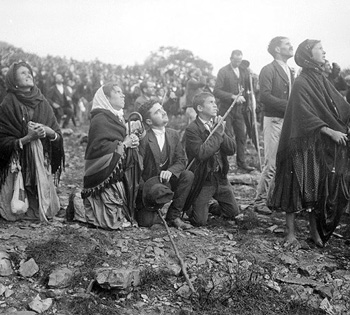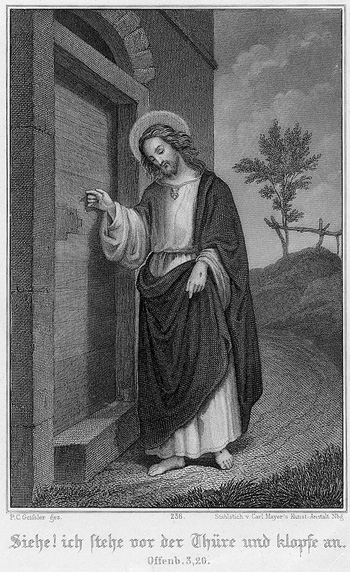Feasts of Our Lady
 |
 |
 |
 |
 |
 |
 |
Ven. Jacinta Marto - February 20
February 20 is the death anniversary of Jacinta Marto to whom Our Lady appeared in Fatima in 1917. As we know, two of the three seers of Fatima died
died as predicted by Our Lady. One remained on earth – Lucia – who received new revelations and is the keeper of the Secret of Fatima up to our days [these comments were made on February 19, 1965].
 As for the reason why Our Lady wanted Jacinta and Francisco to die so young, it is quite evident and they themselves declared it: In the plan of Providence persons are needed to suffer. The two shepherds were the necessary victims associated with the whole mystery of Fatima to give supernatural fecundity to the facts of Fatima. Both of them died in extraordinary painful circumstances and both offered their sufferings to Our Lady to fulfill the plan at Fatima.
As for the reason why Our Lady wanted Jacinta and Francisco to die so young, it is quite evident and they themselves declared it: In the plan of Providence persons are needed to suffer. The two shepherds were the necessary victims associated with the whole mystery of Fatima to give supernatural fecundity to the facts of Fatima. Both of them died in extraordinary painful circumstances and both offered their sufferings to Our Lady to fulfill the plan at Fatima.
All the great works of God are made with the participation of men in the plan of salvation. Souls who fight, suffer and pray are necessary for that work to be accomplished.
 Human sacrifice is always needed. Without human sacrifice nothing great can be accomplished, and this is especially the case of Fatima. Indeed, Fatima was a direct intervention of Our Lady on earth confirmed by a stupendous miracle – the spinning of the sun in the sky. It is one of the most important messages or perhaps the most important message during the entire History.
Human sacrifice is always needed. Without human sacrifice nothing great can be accomplished, and this is especially the case of Fatima. Indeed, Fatima was a direct intervention of Our Lady on earth confirmed by a stupendous miracle – the spinning of the sun in the sky. It is one of the most important messages or perhaps the most important message during the entire History.
On that occasion and in that circumstance Our Lady wanted the sacrifice of two souls who would immolate themselves and offered their lives so that the plan of Divine Providence would receive the necessary fecundity to be fulfilled.
We can understand by this fact how the apostolate of suffering is truly irreplaceable, and how it opens the pathways for the Church to go forward.
Only suffering can open some closed souls
A German painter once depicted Our Lord knocking at the door of a cottage. Someone looking at this painting commented to him: “You made a mistake in your picture because the door does not have a lock.”
 He replied: “It is true, there is no lock but it is not a mistake. This door symbolizes the human heart. Our Lord knocks but cannot open the door. The lock is only on the inside. There is an openness of soul that can only be done inside the person. Only the person can open that door, no one else can intervene.”
He replied: “It is true, there is no lock but it is not a mistake. This door symbolizes the human heart. Our Lord knocks but cannot open the door. The lock is only on the inside. There is an openness of soul that can only be done inside the person. Only the person can open that door, no one else can intervene.”
Well, the way to make souls who do not open themselves to Christ is through prayers and sacrifices. It is through sorrow that we find life. And it is by lovingly carrying the Cross of Our Lord that we can open the soul of someone.
A man is only grand insofar as he carries his cross. Those men who bear great sufferings for the love of God are the only great men of History. Insofar as a man carries his cross, he is faithful to Our Lord, and thus becomes a great man. The decisive men in History were those who suffered everything.
To suffer is not just passive suffering, to accept being slapped on the face, beaten, etc. There is also active suffering, that is, to take the initiative in the fight, to combat the error and evil, to break with those whom we esteem, to endure the harsh criticism of those around us. It is to accept being in difficult, contradictory and unpopular situations; it is to endure the suffering of the courageous and daring battle. All of this is to suffer, and to suffer par excellence.
This is suggested to us by the sacrifice of Jacinta and Francisco.
We should remember this and ask Jacinta to intercede with Our Lady of Fatima to give us an acceptance and understanding of the suffering indispensable for any Catholic to be truly generous and dedicated.
This acceptance of the cross stands against the myth of the modern man, the myth of the North American man that everything has a happy ending, that the normal life is one that ends well, where everyone is happy and suffering is a kind of mad and deranged thing that invades the lives of persons. In fact, the opposite is true: St. Louis Grignion de Montfort goes as far as to say that if a person does not suffer, he should ask for crosses. And that the person who does not receive sufferings from God should be concerned about his eternal salvation.
This is the great truth that we learn from Jacinta, and then ask her for the grace from God to have, through the prayers of Our Lady, the sense of suffering deeply engraved in our souls.



The Saint of the Day features highlights from the lives of saints based on comments made by the late Prof. Plinio Corrêa de Oliveira. Following the example of St. John Bosco who used to make similar talks for the boys of his College, each evening it was Prof. Plinio’s custom to make a short commentary on the lives of the next day’s saint in a meeting for youth in order to encourage them in the practice of virtue and love for the Catholic Church. TIA thought that its readers could profit from these valuable commentaries.
The texts of both the biographical data and the comments come from personal notes taken by Atila S. Guimarães from 1964 to 1995. Given the fact that the source is a personal notebook, it is possible that at times the biographic notes transcribed here will not rigorously follow the original text read by Prof. Plinio. The commentaries have also been adapted and translated for TIA’s site.

Jacinta Marto, March 10, 1910 - February 20, 1920
All the great works of God are made with the participation of men in the plan of salvation. Souls who fight, suffer and pray are necessary for that work to be accomplished.

The sun twirls and dances in the sky
On that occasion and in that circumstance Our Lady wanted the sacrifice of two souls who would immolate themselves and offered their lives so that the plan of Divine Providence would receive the necessary fecundity to be fulfilled.
We can understand by this fact how the apostolate of suffering is truly irreplaceable, and how it opens the pathways for the Church to go forward.
Only suffering can open some closed souls
A German painter once depicted Our Lord knocking at the door of a cottage. Someone looking at this painting commented to him: “You made a mistake in your picture because the door does not have a lock.”

Our Lord knocks, asking us to open our heart to Him
Well, the way to make souls who do not open themselves to Christ is through prayers and sacrifices. It is through sorrow that we find life. And it is by lovingly carrying the Cross of Our Lord that we can open the soul of someone.
A man is only grand insofar as he carries his cross. Those men who bear great sufferings for the love of God are the only great men of History. Insofar as a man carries his cross, he is faithful to Our Lord, and thus becomes a great man. The decisive men in History were those who suffered everything.
To suffer is not just passive suffering, to accept being slapped on the face, beaten, etc. There is also active suffering, that is, to take the initiative in the fight, to combat the error and evil, to break with those whom we esteem, to endure the harsh criticism of those around us. It is to accept being in difficult, contradictory and unpopular situations; it is to endure the suffering of the courageous and daring battle. All of this is to suffer, and to suffer par excellence.
This is suggested to us by the sacrifice of Jacinta and Francisco.
We should remember this and ask Jacinta to intercede with Our Lady of Fatima to give us an acceptance and understanding of the suffering indispensable for any Catholic to be truly generous and dedicated.
This acceptance of the cross stands against the myth of the modern man, the myth of the North American man that everything has a happy ending, that the normal life is one that ends well, where everyone is happy and suffering is a kind of mad and deranged thing that invades the lives of persons. In fact, the opposite is true: St. Louis Grignion de Montfort goes as far as to say that if a person does not suffer, he should ask for crosses. And that the person who does not receive sufferings from God should be concerned about his eternal salvation.
This is the great truth that we learn from Jacinta, and then ask her for the grace from God to have, through the prayers of Our Lady, the sense of suffering deeply engraved in our souls.

 | |
|
|
The texts of both the biographical data and the comments come from personal notes taken by Atila S. Guimarães from 1964 to 1995. Given the fact that the source is a personal notebook, it is possible that at times the biographic notes transcribed here will not rigorously follow the original text read by Prof. Plinio. The commentaries have also been adapted and translated for TIA’s site.


